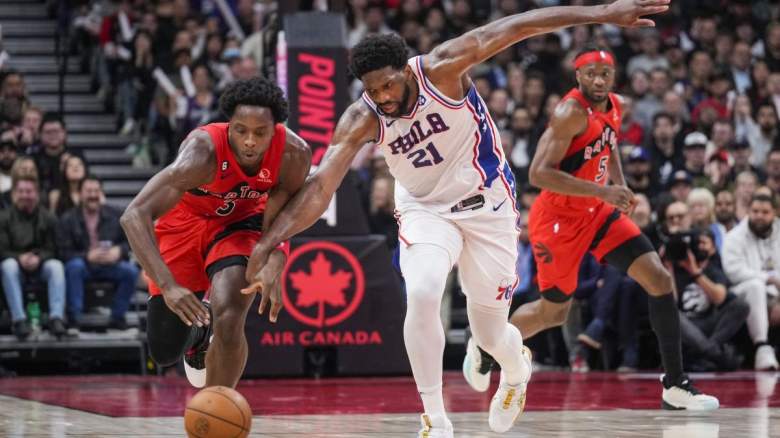
The Philadelphia 76ers‘ dreadful start to the 2022-23 season continues as they have now fallen to 1-4 to start the year. The most recent loss came north of the border at the hands of the Raptors by a score of 119-109. While the margin may have only been 10 points, it felt as if the Sixers were never in the matchup. The Sixers did not outscore the Raptors in a single quarter and Toronto appeared one step ahead on both sides of the ball.
The Raptors starters combined for 93 points and flashed their hot shooting right from the opening tip. The Sixers struggled to match up with their versatile lineup and fluid movement. This was especially seen in transition where Toronto outscored the Sixers 29-17. This number could have been much higher with there being countless moments in which Raptors players beat the Sixers down the court.
Transition Struggles a Theme?
While they are only five games into the regular season, this is quickly becoming a theme. Coming into the matchup, the Sixers ranked 26th in the NBA in transition defense by allowing 19.3 points per game. Including the Raptors’ loss, the Sixers have been outscored 106-57 in fast break points this season.
This also has been an issue dating back to before this season. The Sixers ended last year ranked 28th in the NBA in opponents’ fast break points per game. With guys like De’Anthony Melton and Danuel House Jr. adding a notable splash of athleticism and energy to the roster, the hope is that this would change. It is still early on in the year but the early signs have been that this is still a glaring weakness.
Where Do The Sixers Go From Here?
To some extent, the adjustment is simply within the effort of the Sixers on the floor. There is no excuse for players to constantly be outrun down the court as has been the case to open the season and in past years.
Some of it can be credited to the schematic set-up as well. The Sixers run just about every offensive set with two players (typically Tobias Harris and P.J. Tucker) sitting in the corner and spacing the floor. While this is a valuable shot and a space on the floor that should be utilized, it also puts them behind in a quick change of possession.
Joel Embiid has been seen hitting the floor extremely often and James Harden is not shy about conversations with referees following a perceived missed call. Neither player is of use to helping stop the opponents’ offense when this is the case.
Oftentimes when a team lacks in transition, it is because they are too deep in the opposing zone competing for offensive rebounds. This has not been the case for Philadelphia either as the Sixers rank dead last in the NBA in offensive rebounding and add just 6.6 offensive rebounds per game. For reference, the Utah Jazz are leading the NBA by earning 15.8 second-chance opportunities per game.
For a team with such large aspirations at the end of the season, the failure to take care of these little things has been unacceptable from the Sixers. They will continue to be crippled by these lapses throughout the season just as was the case in the Toronto matchup unless adjustments are made. The Sixers are loaded with talent and a far better team than their record or level of play has shown. There are plenty of areas to look toward for improvement, but focusing on getting back and stopping transition defense must be where they start.


















Comments
Sixers Biggest Weakness Put On Display In Loss to Raptors